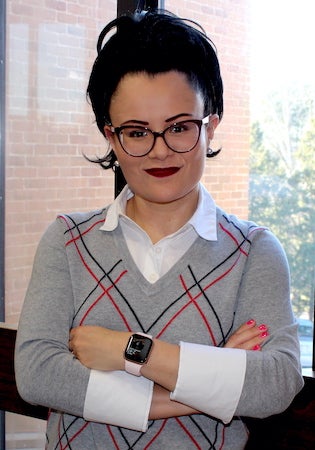“Any person from any background, with the right resources and the right support, can achieve a dream.”
While she acknowledges such a sentiment may sound corny to some, it is anything but a cliché to the University of Rhode Island College of Nursing’s newest assistant professor, Dr. Dahianna Lopez. From a very early age, Lopez faced challenges no young person should be forced to endure, challenges that could have easily held her down and derailed her dreams of making an impact on public health in society.
“I come from a really severely underserved background,” Lopez said. “I was homeless at one point when I was younger. I was also a victim of domestic violence. I’m an immigrant—I was born in Mexico—and as a woman and a person of color, it’s been tough to navigate the world with the stereotypes there are about people like me. They’re compounded and you walk around with these labels attached to you, so you’re not always treated fairly. People like me have a lot of microaggressions thrown at them every day, and I’ve learned to be resilient, to advocate for myself and to build a network of supportive people around me.”
Despite the disadvantages she faced, Lopez overcame a difficult childhood and worked her way to some of the most prestigeous universities in the country, earning multiple degrees, including two master’s degrees, a and a Ph.D. After establishing herself as a public health expert focused primarily on injury prevention, and alternating between academic research and implementation at the public health level, Lopez eventually landed as a tenure-track professor at URI in January 2020.
“One of the things that drew me to here at URI is that it has a lot of students that come from a background like mine,” Lopez said. “And I bring to this university the ability to connect with students and say to them, ‘I know where you’re at, I’ve been where you are, and to some extent, I’m still there.’ Students will see a professor who has beat the odds, has worked really hard to achieve her dreams, and hopefully, students can say ‘I can do the same thing. I can be that amazing nurse; I can be that professor; I can be whatever I want.’ And if my story inspires students to dream big, I will feel accomplished.”
This semester, Lopez will be teaching community health nursing to undergraduate students, while continuing her research into injury prevention. She also plans to create a course on the subject. Read on for more about her experience and research focus.
Education: Ph.D., Harvard University; M.S. in Nursing, University of California, Los Angeles; M.S. in Public Health, University of California, Los Angeles; B.A., University of California, Berkeley.
Experience: Lopez comes to URI after a stint as a senior public health epidemiologist at the Rhode Island Department of Health, where she evaluated health-related initiatives of the Drug Overdose Prevention Program and determined their effectiveness, specifically dealing with opioid-related poisonings. She also worked for the City of Providence, where she Identified, interpreted, and recommended best practices and evaluation methods for public health interventions and programs. Previously, she served as Director of Injury Prevention for San Francisco General Hospital and the University of California, San Francisco; research associate for the University of California, Los Angeles, School of Nursing; patient health education coordinator for the Veterans Administration Hospital, Greater Los Angeles; and research associate for the UCLA Neuropsychiatric Institute. In San Francisco and Boston, Lopez studied pedestrian and bicycle injuries, and was an advocate for transportation safety, helping transform those cities’ transportation designs.
Research focus: Lopez’s research focus is on injury prevention, especially unintentional injuries sustained in transportation accidents, including car and bicycle crashes, and those from accidental poisonings. She examines injury prevention at the macro-public health level, looking at all aspects of an injury-causing event, not just the injury outcome. For example, when examining a car crash, an injury prevention specialist will examine not just the behavior of the drivers, but also the environment of the road, the engineering of the car, the safety features of a vehicle and whether they were effective in preventing injury, etc. “I’m not in a hospital or clinic working with individual patients; I’m really looking at populations, and most specifically, I’m looking at ways we use the science that we have to fix a problem,” Lopez said. “There are numerous research studies that have identified effective solutions for preventing injuries. How do we then take the findings of these studies and apply them in the real world?”

